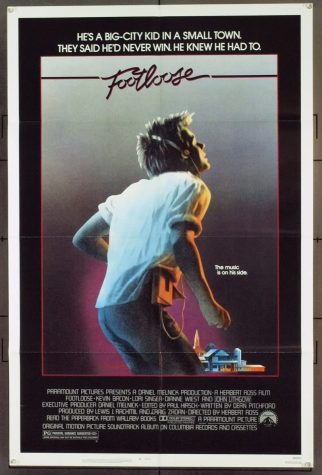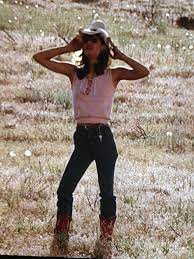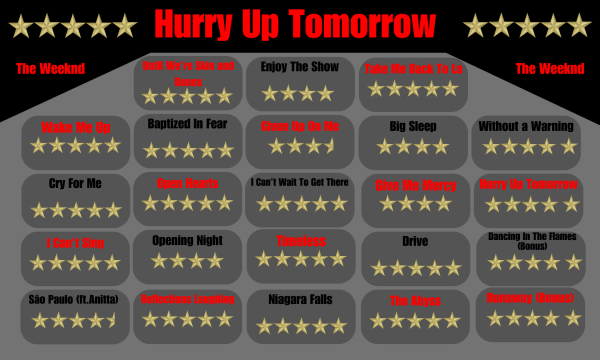FOOTLOOSE: THE PURSUIT OF HOLINESS, BLIND EYES, AND REBELLION
Footloose:
“Let ‘em dance,” said Raymond Lee, school board president of Elmore City, OK, in 1980. It was this statement, according to The Cinemaholic, that lifted the ban on dancing and rock music in the town- allowing the class of 1981 to host a junior prom.
Inspired by the events of Elmore, Dean Pitchfork wrote a screenplay, and in 1984, Footloose was released.
Footloose is part ensemble, part intimate drama. Primarily, it focuses on the life of Ren McCormack (Kevin Bacon), a high school student who has recently moved from Chicago, IL, to Bomont, TX. Ren struggles to settle into the town, finding himself the scapegoat for the antics of the local teens, and discovering that his favorite pastimes- listening to rock music and dancing- are outlawed. When Ren meets Ariel Moore (Lori Singer), the reckless daughter of conservative preacher Shawn Moore (John Lithgow), he grows restless, and begins plotting to bring a senior prom to Bomont.

In terms of tone, Footloose is a combination of Dirty Dancing and Rebel Without A Cause. It features the dancing and music of the former, and the dynamics of the latter. Romance may fuel the relationship of the main characters, but the lives of secondary characters like Willard (Chris Penn) and Rusty (Sarah Jessica Parker) are also explored. And, like both of the previously mentioned films, the story of teen-angst is set against the backdrop of changing parental dynamics.
For Ren, this manifests as difficult conversations with his mom about his dad leaving. For Ariel, it results in a multi-month conflict with her father wherein she acts out the most she can, and he berates her for doing so. Ariel floats from relationship to relationship, most of which are unhealthy. She repeatedly risks her own life, and seemingly has no care for her own future.
The reasoning behind each of their actions stems back to the death of Ariel’s brother several years prior. The accident took place after her brother, as well as other teens, went drinking and dancing across state lines. As they drove back into town, they got into a car accident that resulted in the death of all involved. It is this event that pushes Bomont to ban rock music and dancing.
For Ariel, this event spurs her to live wildly. She lives as though her life may abruptly be cut short. Her father, however, thinks of this event as a reminder to protect his children, preserving them for their future. The result of this is that there are no open lines of communication. Ariel doesn’t trust her father not to lecture her-for good reason- and her father doesn’t trust her enough to listen.
In order to prove to the other the validity of their choices, they escalate the stakes of what they’re doing. Ariel sneaks away with Ren to go dancing at a bar, she gets into fights, and she wears her red boots- a symbol of her discontent- everywhere. At the same time, Pastor Moore’s sermons become increasingly evangelical. He uses the Bible to condemn dancing, and to criticize those who stand against him. They both become the center of their respective worlds.
The people close to Ariel become more restless and aggressive with one another. They start taking risks with less fear of the repercussions, and their discontent makes itself known. In contrast, those who listen to Pastor Moore lean into the idea of censorship as a way to ‘protect’ their children. Books get banned, rules get stricter, and curfews are shortened.
The standoff between the older and younger members of the town culminates in two parts- when citizens start burning library books, and a school board meeting when Ren asks to host a senior prom.

The first of these events is the breaking point for Pastor Moore and his ideals. Having had multiple difficult conversations with his wife Vi (Dianne Wiest), Pastor Moore realizes that he is pushing Ariel farther and farther away. He sees that his actions are directly harmful, and understands that he has a lot to lose by not cleaning his act up. When he hears about the book burning, Moore sees that his actions have ripples, and that, regardless of his intentions, people have been using his words to validate their own closed-mindedness. By stopping the book burning, he resets the precedent and shows that Bomont can be strict without being bigoted.
This precedent is ultimately what makes the adults of Bomont more open to Ren’s proposal. While ultimately the School Board votes against the dance, other adults- like Ren’s boss- come together to make the dance possible.
The students are able to meet on the edge of town and have the night- and the quintessential teenage experience- they were promised.
Footloose is a perfect case study in the dangers of ignoring the ripples of our own actions. All of the adult characters refuse to believe that bad things happen in Bomont, or that their children are responsible for it. This is why they blame Ren for things that are not his fault. Finding a scapegoat is easier than realizing you have set bad examples for your children.
Additionally, the adults do not see the way their behavior influences culture in the town. Pastor Moore’s preaching is harsh, but he does not think this will lead to others being harsh. By viewing our actions as self-contained, we refuse to take responsibility for the ways we hurt those around us. By viewing our actions as self-contained, we create a society that is not introspective, and one that cannot fix itself or improve.
Footloose warns us against becoming insular and unaccepting to change, and it also celebrates the relationships teenagers make with one another. It’s a testament to powerful friendships, the power of positive influence, and the way that communities can heal after trauma. It’s important to remember that nothing flourishes in the dark, and the first step to healing is talking- and listening.
9/10 would wear red boots again
Further breakdown:
Writing Quality: 9.25/10 Enjoyability: 9.5/10
Pace: 9/10 Visual elements: 9/10
Plot development: 9/10 Insightfulness: 9.5/10
Characters: 10/10





